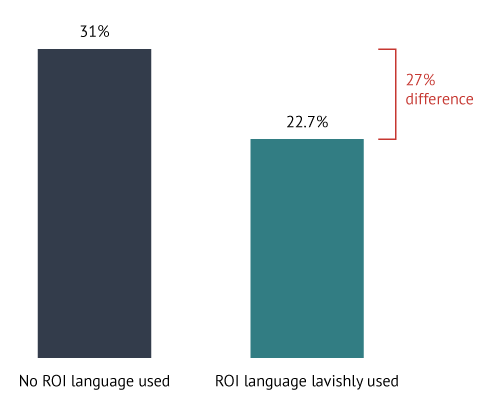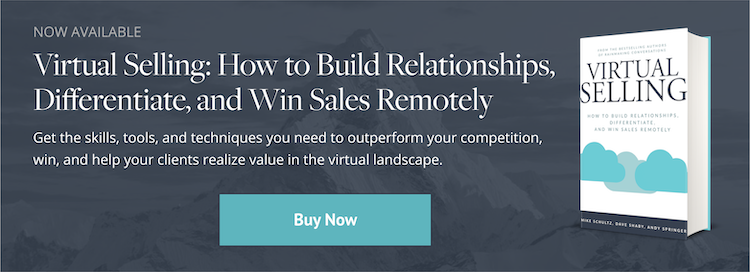Emotions are powerful motivators of buying.
Consider that, in 2019, total U.S. spending in the weight loss category was $72.7 billion according to marketresearch.com. That's a lot of money spent on products and services that help people eat well and exercise more.
The businesses making all this money know they can't encourage these purchases by focusing on the ROI in monetary terms. That's because, for many buyers, the ROI of weight loss and healthier eating habits is, essentially, emotional. (Though you can certainly measure the ROI of healthier habits in terms of pounds lost or health benefits gained.)
People buy with their hearts and justify with their minds, and not just when it comes to their health.
Business-to-business (B2B) buyers need a strong financial and emotional ROI case to justify their decisions. This is especially so during a time when the complexities of virtual selling and rough economic conditions dominate. Unfortunately, for the most part, buyers aren't getting what they need from sellers. Two-thirds (66%) of B2B buyers who buy virtually say that when sellers make the ROI case clear, it has a high influence on their likelihood to purchase. But those same buyers find that only 16% of sellers are very effective at making it.
In fact, of 15 different seller skills we studied through the eyes of buyers, sellers were worst—15th out of 15—in "making the return on investment (ROI) case clear to me."
Correcting the Key Misconceptions of ROI Case-Making
Often, when it comes to impact and ROI case-making, sellers fall back on one of many general misconceptions, and this leads to lower sales results. Consider the following four we've heard most often during our work with more than 1,000 sales organizations and through decades of analysis at the RAIN Group Center for Sales Research.
1. "Impact is about the financial case—the hard ROI numbers."
For many buyers, ROI isn't solely financial. The ROI case used by buyers to rationalize their decisions, and sell them internally to peers, are largely emotional.
Even in business, decisions are driven by wants, desires, and fears. Purchases are then justified by rational ROI cases. Which is not to say major purchases are made on gut feelings alone. But sometimes, what leads a buyer to make a purchase is driven by a feeling that they would lag behind their peers, the competition, or would simply miss out on a valuable opportunity. In other words, yes, FOMO is real.
2. "I know how to make the ROI case; I'm good at this."
The perception gap here is a wide one. While sellers are often confident in their ability to make the ROI case, our research shows that only 16% of buyers believe sellers are very effective at doing it. By contrast, 32% of sellers think they can make the ROI case well, a percentage twice as large. Sales leaders would be wise to further train and evaluate their sellers before placing them in front of potential buyers so they don't miss any opportunities.
3. "I'll show them the ROI case, and it'll be impressive."
It's not that easy. Buyers receive pitches all the time, especially in the B2B space. An overconfident and underprepared seller will likely encounter a buyer who's seen many conventional, generic pitches in the past, and will therefore push back or tune out the seller completely. Punching in estimated numbers or guesses without really understanding the buyer's situation just won't cut it.
You have to be smart, ask the right questions, and share a customized ROI case in-depth to show you understand the buyer's needs, know the numbers front-to-back, and anticipate any questions or objections that may come up.
4. "I'll show them the ROI, and that'll be enough."
Sellers need to show buyers the potential ROI in the context of a new reality, or it may hurt their chances of success. What outcomes will be achieved, and what tangible benefits will be gained, when the buyer decides to work with you? Buyers need to envision themselves at the end of the journey. And, equally important, how will this happen?
Sellers need buyers to believe deeply that the ROI is reasonably achievable. Think of your pitch as a teachable opportunity: make sure your buyer fully understands what you're able to do for them so they can communicate it to the rest of the influencers in their organization. Otherwise, your sale may get stuck in endless internal discussions.
Presenting ROI Incorrectly Correlates with a 27% Drop in Win Rates
When it comes to communicating the impact in sales, remember: making the ROI case is critical to success. If you don't make a case, you're more likely to lose the sale.
More important is to make sure the ROI case is plausible and believable. Even if sellers can make the ROI case, they often underestimate the effort needed to get buyers to accept and support it. Buyers chuckle under their breath at how often sellers use generic ROI calculators.
Consider an analysis of tens of thousands of sales calls by revenue intelligence platform Gong. According to this study, ineffective attempts by sellers to present ROI correlate with deals going south.
Effect of Presenting Implausible or Unbelievable ROI

Gong's findings support our point that you need to make your ROI case, and not just talk about or present it. They even note it's possible "presenting ROI does work, but most salespeople do it so naively that it backfires" and that "most attempts at presenting ROI are a desperate Hail Mary to save hopeless deals."
Both are probably true often enough. We'd add that, in our experience, many sellers throw around ROI numbers willy-nilly they say are "often achieved" with their solution, but they don't customize the pitch to make the ROI case for specific buyers; they don't even attempt it.
Successful Sales Begin with a Strong ROI Case
How you build and present the ROI case is, we'd argue, even more important than the details of the case itself. In fact, you can use virtual selling to your advantage here by building the ROI case with your buyer during your calls or together on screen when available.
Asking the right questions and sharing the ROI case using the buyer's actual data and responses to your questions will go a long way toward showing the buyer you understand their challenges and are the partner they need, which will allow you to, ultimately, close the sale. Because of this, building a strong case is one of the most important skills for mastering the sales process.
Don't fall back on misconceptions. A customized ROI case that covers both the financial and emotional motivations to buy will allow you to influence more buyers and give you the greatest chance of winning more sales.
Want to learn how to make a stronger ROI case, lead masterful virtual sales conversations, and become a top-performing seller in this new environment? Check out our new book, Virtual Selling, available now.







